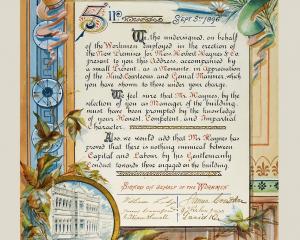Caroline Lark still remembers the thrill of anticipation on hearing the words, ''Are you sitting comfortably? Then I'll begin,'' the introduction to the BBC children's radio programme Listen with Mother, which ran between 1950 and 1982.
''I listened with my busy mother to the stories, enjoying the dramatised voices of different characters, throughout the mid-'60s,'' the tutor of a one-week University of Otago Summer School programme, ''Wordsmith: Radio Drama'', recalls.
''My mother listened to Woman's Hour and The Archers. And when my father came home from work, he laughed at the Goons and Hancock's Half Hour and, even though I didn't get the jokes, I laughed along with him.''
A playwright, fiction writer and poet who has had three radio plays (Felicity, Sad Heron and Gray's Sequence) produced by Radio New Zealand, Lark will cover a range of disciplines in the one-week summer school programme, from script writing, establishing context and ''thinking in sound'' to editing and industry advice.
Born in London, Lark was introduced to radio drama at a young age (''It was the soundtrack to my childhood, teens and 20s ...'') and has enjoyed a range of writing, from audio adaptations of Shakespeare pieces to original plays for radio by Tom Stoppard, Harold Pinter, Samuel Beckett and others, ''a few of them women''.
''Radio drama was and is an important part of the fabric of English cultural life. In the late '50s and throughout the '60s, the BBC commissioned and broadcast many new exciting radio plays. I was lucky to have this quality drama as a backdrop to home life,'' Lark explains.
''The first radio play to have a profound impact on me was Anthony Minghella's award-winning Cigarettes and Chocolate, first broadcast in 1988, the year I was pregnant with my second child.''
Minghella, a film director and screenwriter who won an Academy Award for The English Patient, had a strong sense of imagery and that style of writing spoke directly to Lark.
''Cigarettes and Chocolate tells the story of Gemma, her unexplained silence and refusal to speak, and how her circle of friends and lovers react.
''I admired the originality of the play, written entirely in answerphone messages left for a silent main character who won't pick up. Here was a drama specifically for radio and no other medium; it wouldn't have worked as a film or a stage play.
''I could see the silent main character lying in the dark on the floor, eyes shut, listening to all her messages one after the other. Other listeners may have imagined her in the bath or doing yoga or watching TV with the sound switched off.
"The play gave the individual listener space to create his or her own images inside the drama.''
There are plenty of challenges in writing a successful radio play, Lark says.
The biggest is to grab the listener's attention; the second biggest is to keep it.
''A listener may be cooking, driving, gardening, in hospital, at home washing up, feeding children, whatever.
''He or she is otherwise engaged and the radio is probably on in the background. You're competing for attention with noises and people around the listener, distractions such as phone calls, chats with friends, domestic chores, even medical procedures,'' Lark notes.
''None of those happens in the theatre, where the playwright has a silent, captive audience for a couple of hours. And a reader can always put down the novel, poetry or short story collection and come back to it.''
Thus there is no shortage of conventions to avoid producing a mediocre radio play.
''For example, unless you want cacophony, it's obviously best not to have characters talking all at once. Also, each character requires a voice ''tag'', so that the listener knows who's talking. For example, accents are useful.
''Dialogue is crucial in radio drama,'' Lark notes.
''In films, much of the story can be conveyed without words; on stage, actors' actions, gestures and use of props can be directed to portray character and motivations and the set suggests the location.
''However, in radio drama the dialogue has to convey not only story, but also character and location. It takes experience and skill to write subtle dialogue to deliver information, develop character and move the story forward without the listener noticing the devices.''
Yet subtlety - silence even - also has a role.
''Give the listener room to imagine what the characters look like and create their own visuals of the players and the location; this means not always putting in every single detail of appearances,'' Lark advises.
''Debussy said, `Music is the silence between the notes'. In the same way, a radio drama could be said to be the silence between the dialogue. Silence is very important, a pause is not just a void; it can mean different things depending on the content of the speech and the tone of voice.
''Silence is very useful for creating suspense and emotional impact, for example excitement or sadness, before or after speeches.''
Other tools can be brought to bear, too. Music can underscore or subvert dialogue or provide an atmospheric nuance to what's being said. Likewise, sound effects can flesh out dialogue, providing the noises of actions and props being used, creating a mental image alongside words.
Although Lark concedes the glory days of radio drama (the late '50s and early '60s) are over, opportunities remain for writers of radio drama in New Zealand, including with Radio New Zealand and the BBC World Service.
FACT FILE
• Born in London, Caroline Lark studied at the University of Cambridge, (fine arts, philosophy, psychology of education, BEd hons) and Anglia Ruskin University (postgraduate diploma English studies) and divides her time between New Zealand and England. Her work is collected in the Royal Festival Hall, Southbank Poetry Library, London, and on the Aotearoa New Zealand Poetry Sound Archive, Alexander Turnbull Library, Wellington.
• A playwright, fiction writer and poet who has had her work published in the UK, France, NZ and Australia, Lark has had three radio plays produced by Radio NZ and her latest stage play, Eros, was performed at The Court Theatre in Christchurch in 2010. She was the winner of the Hazard Press/Quote Unquote Fiction Award in 1995 with her novella, Days, and her poetry collection, A Messy Affair, was published by Steele Roberts in 2011.
• Lark has taught creative writing (poetry, fiction, playwriting) at the University of Canterbury, the University of Auckland, the University of Otago and Waiheke Island Summer Schools.
The course
• The University of Otago Summer School is offering Wordsmith: Radio Drama from February 9-13 (10am-1pm each day).
For more information, visit: www.otago.ac.nz/continuingeducation.












